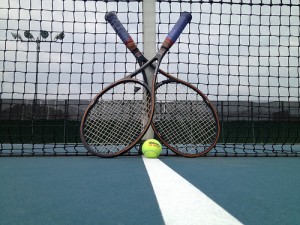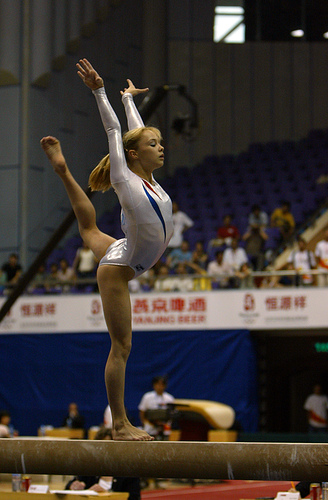My parents were ecstatic to have a tall girl like me on their hands. There were so many possibilities involving a girl, some form of ball, and a college scholarship.
But reality came crashing down when I dribbled the ball down the court the wrong way and broke both my wrists at the same time in a very polished backward fall. My parents drug me to all kinds of training and practices just to hear coaches say things like “we’ll put her in next time” and “we are winning by twenty, so what the hell.” Soccer required all that running, volleyball required all that depth perception, and they pretty much gave up on me until tennis came along.
Now tennis, I actually liked. I was terrible, mind you, but I didn’t have people yelling at me or telling me I sucked when it was just me and a wallboard, blissfully mastering the art of backhands with a bucket of balls. Seeing a glimmer of hope that I might lead a normal life and not become a colossal choir nerd, my parents enrolled me in private lessons. They drug me across town to the country club with the rich kids so I could attend tennis camp and bought me little tennis skirts with blue and yellow stripes. In the summer, in my tennis skirt, with a private coach, with sweat running down my forehead, I felt special. I felt athletic. I finally felt as if I was part of something.
Fast forward to the school year, where I was known as the girl-who-fell-down-a-lot-and-wheezed, and the tennis coach apparently didn’t glom onto my enthusiasm. I never won a game, I couldn’t keep up with the drills, and my shots looked sort-of like this:
- Miss (that was weird)
- Miss (the sun, it was in my eyes)
- Ball over the fence (looking down at racket, which is clearly strung improperly)
- Amazing backhand that whizzed over the net cross-court and no one could touch
Forever an optimist, I saw this twenty-five percent ratio as total success. For some reason, even though the tennis coach told me once that “you either have it or you don’t, so as far as you go, please keep singing in choir,” he let me on the team. Probably because I was a senior, and it was my life goal to get an athletic letter jacket (how else would I display all those music patches?), and because I was a funny girl that made the team laugh. So I became like the “official team encourager” that went along to all the tennis meets and looked the part. But no one even asked if I won a game – after a while they were sort-of shocked that I was even in the tournament to begin with. But golly I tried, and I always kicked the dirt when I lost, and believed I’d do better next time. High school finally ended, the yearbook had a picture of me looking very athletic, and looking back I should have just rested in this glory forever.
And yet.
One day in college, bored and wanting for a date, I rolled up my sleeves one afternoon and hit the court with a bucket of balls and my old tennis racket. It was a good stress reliever, the weather was nice and hot, and I was suddenly filled with the sensation that I could actually play. Maybe I did have talent hidden underneath my goofy exterior that just needed some time to germinate before it finally blossomed like a beautiful flower.
That wasn’t true, of course. I think it might have been heatstroke.
But my parents always told me I could do anything I set my mind to, so I contacted the athletic department. I was going to try out for the Texas Tech University Tennis Team. A school of thirty-thousand students, with athletes who fly across the world to compete? No problemo. Yes, I was available to meet with the coach for an information interview. Yes, I was more than happy to work out with the team. And yes, why of course I could play tennis at a very professional level. State championship? Well, no. But I have many, many participation ribbons and a really awesome set of jokes. That should count for something.
For a month, I got to eat at the athletic dining hall, and made many friends with people from Sweden and Missouri. I was fascinated by the whole experience and soaked it up with vigor. I ran laps and said “hell yeah suckahs!” and wore the perfect grimace. But eventually, I had to hit the ball. And thus began the comedic efforts of One Who Cannot Actually Play Tennis at the college level, bumbling and missing and having a terrific ‘ol time. The girl from Sweden just looked at me like I just recently landed on Planet Earth.
The coach was so incredibly sweet, and pulled me aside after a few days to give me the tragic news. “You didn’t make the team,” she said. She offered some great advice, like perhaps years and years of lessons. Or an arm transplant. Perhaps a racket that hits the balls for you. Or sticking with choir. I thanked her so much, and hugged the Swedish girl. I smiled my big Texas smile. “It’s just such an honor,” I said as I held my hand to my heart and dabbed tears. But by this time they had turned their heads, back to practice. I was totally that kid on American idol who sounds like metal parts rubbing together that everyone laughs at. Get the crazy girl off the court.
I went on to do fulfilling and wonderful things in college, like being a Resident Assistant in the dorms (is that pot I smell?), singing baroque music (oh beauty, oh harmony), or meeting my friends in the dining hall for chicken strips (the gravy/ it’s divine). I had a very dorky useless boring amazing college life, and I don’t regret for one day my near-brush with athletic fame and fortune.
I think the lesson to be learned here is to never give up. One day, you may actually realize what you’re good at and quit making a fool of yourself. But what’s the fun in that?
Keep on playing, suckahs. . .
—
photo:
http://www.flickr.com/photos/skelastic/7817107614/sizes/m/in/photolist-cULHKu-cR6eqN-cULMNC-cULMnC-cR6eKb-cULRUL-cULV9Y-cR82Lm-cULK1A-cR6cTY-cULTib-cULVFq-cULP7E-cR83Kf-cULJQw-cULTBY-cULUuj-cR6ecm-cULQFh-cULS5J-cR834q-cULK9U-cULLT1-cULNDG-cULQfb-cULRdw-cULMZ5-cULU5j-cULQ8C-cULT8y-cR81Qm-cULLLY-cULKPo-cULLsC-cULM47-cULRGs-cULSpf-cULRxq-cULVkd-cULNYm-cULVSC-cULMCu-cULKYC-cULLAC-cULSg5-cULUHh-cR7Xe7-cR7Wz9-cULNtq-cULQYq-cULJBw/











